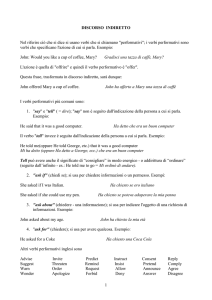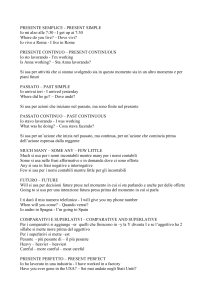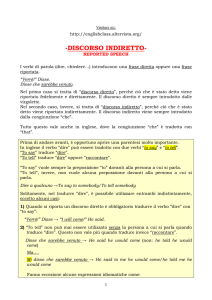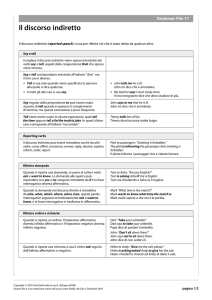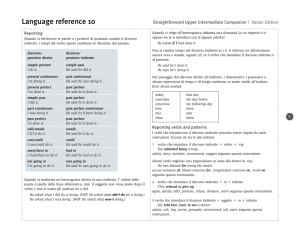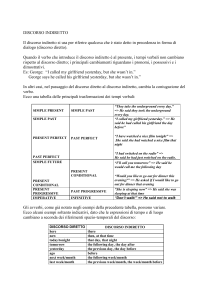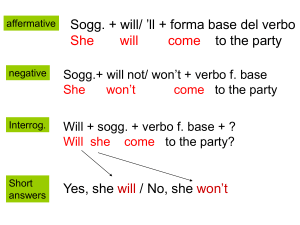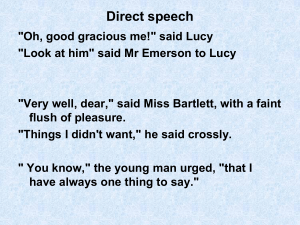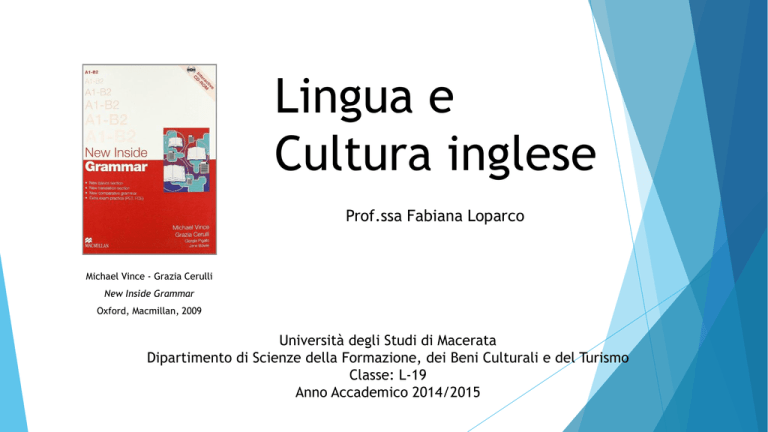
Lingua e
Cultura inglese
Prof.ssa Fabiana Loparco
Michael Vince - Grazia Cerulli
New Inside Grammar
Oxford, Macmillan, 2009
Università degli Studi di Macerata
Dipartimento di Scienze della Formazione, dei Beni Culturali e del Turismo
Classe: L-19
Anno Accademico 2014/2015
Lesson number: 13
1. Discorso indiretto
2. Say e tell
3. Futuro nel passato (Future in the past)
1. Discorso indiretto
Nel riportare un discorso, il tempo cambia se il verbo che introduce il discorso indiretto è al passato. I
cambiamenti sono simili all’italiano, tranne per il futuro (che diventa condizionale presente) e per il
condizionale presente che rimane invariato.
Discorso diretto
Discorso indiretto
Present simple
Past simple
‘I need a piece of paper’ she said
She said (that) she needed a piece of paper
Present Continuous
Past continuous
‘She’s going away’, he said
He said (that) she was going away
Past Simple
‘We ate a lot’, they said
Past Perfect
Present Perfect
They said (that) they had eaten a lot
‘We have eaten a lot’ they said
Discorso diretto
Discorso indiretto
Will
Would
‘I’ll be back soon’, he said
He said (that) he would be back soon
Be going to
‘We’re going to buy a new car’, they said
Can
‘He can’t read or write yet’, they said
Must
‘I must lock the front door’ he said
Was/were going to
They said (that) they were going to buy a new car
Could
They said (that) he couldn’t read and write yet
Had to
He said he had to lock the front door
Might, could, should e would
Might, could, should e would
‘I might come to the party’, she said
She said she might come to the party
Fra gli elementi della frase che cambiano nel passaggio dal discorso diretto a quello indiretto ci sono:
Gli avverbi di tempo
Today -> that day
Yesterday -> the day before
Tomorrow -> the next/following day
Now -> then
This week/month/year -> that week/month/year
A week/month/year ago -> a week/month/year before
‘I can’t meet you today’, he said
->
He said he couldn’t meet me that day
Gli avverbi di luogo
here -> there
I dimostrativi
this -> that
these -> those
I pronomi personali, i possessivi (tranne quando si parla si se stessi)
‘I lost my wallet’, he said
->
He said he had lost his wallet
In alcuni casi i verbi rimangono invariati: ciò accade quando la situazione di cui si parla non è
cambiata
‘I still like Jean’, said Ted
Ted said he still likes Jean
‘It’ll be rainy the whole of the next week’, the weather man said
The weather man said it’ll be rainy the whole of the next week
Exercises
Trasforma queste frasi nel discorso indiretto
•
‘I’m leaving’, she said
______________________________________________
•
‘I saw the film on Monday’, Tom said
______________________________________________
•
‘I’ve missed the bus’, Maria said
______________________________________________
•
‘We live in Marsden Street’, they said
______________________________________________
•
I’ll phone tomorrow’, Anna said
______________________________________________
•
‘I’m having a good time’, Carol said
______________________________________________
Exercises
Trasforma queste frasi nel discorso indiretto
•
‘I’m leaving’, she said
She said (that) she was leaving
•
‘I saw the film on Monday’, Tom said
Tom said (that) he had seen the film on Monday
•
‘I’ve missed the bus’, Maria said
Maria said (that) she had missed the bus
•
‘We live in Marsden Street’, they said
They said (that) they lived in Marsden Street
•
I’ll phone tomorrow’, Anna said
Anna said (that) she would phone the next/following day
•
‘I’m having a good time’, Carol said
Carol said (that) she was having a good time
Exercises
Trasforma queste frasi nel discorso diretto
•
She said that she was leaving at six
______________________________________________
•
He said Peter often went fishing
______________________________________________
•
She said she would be back later
______________________________________________
•
I said that I had just seen Mark
______________________________________________
•
Alan said that they had left at 6.00
______________________________________________
•
Helen said that she was working
______________________________________________
Exercises
Trasforma queste frasi nel discorso diretto
•
She said that she was leaving at six
‘I’m leaving at six’, she said
•
He said Peter often went fishing
‘Peter often goes fishing’, he said
•
She said she would be back later
‘I’ll be back later’, she said
•
I said that I had just seen Mark
‘I have just seen Mark’, I said
•
Alan said that they had left at 6.00
‘They left at 6.00’, Alan said
•
Helen said that she was working
‘I’m working’, Helen said
Discorso indiretto: domande e imperativo
Se nel discorso indiretto la domanda prevede una risposta chiusa, nel discorso indiretto l’interrogativa
viene introdotta da if o whether
‘Do you live in Milan?’, she asked
She asked if/whether I lived in Milan
‘Can Alice speak Spanish?’, he asked
He asked if/whether Alice could speak Spanish
Se nel discorso diretto la domanda è introdotta da una question word l’ordine delle parole cambia nel
seguente modo:
Interrogativa diretta (l’ausiliare precede il soggetto)
Question word +
ausiliare
+
soggetto
‘Where
do
your parents
Interrogativa indiretta (il soggetto precede il verbo)
Question word
+
soggetto
+
He asked where
my parents
non where lived my parents
verbo
lived
+
verbo
live?’, he asked
‘How old is Bruno?’, she asked
She asked how old Bruno was
Tuttavia, con what, who e which + be, l’ordine può essere lo stesso dell’interrogativa diretta
‘Who is the winner?’ he asked
He asked who the winner was/who was the winner
Tra i verbi introduttivi nel discorso indiretto ci sono ask, want to know, wonder e inquire. Ricorda che
ask è seguito dal complemento oggetto quando vuole specificare a chi è stata fatta la domanda
‘Where is the bus station?’
He wanted to know where the bus station was
He asked me where the bus station was
‘Why did you go there?’
She wondered why he had gone there
L’imperativo
Nel discorso indiretto gli ordini vengono introdotti con tell + infinito
‘Wait!’
I told him to wait
‘Don’t run!’
She told him not to run
Le richieste nel discorso indiretto vengono invece introdotte da ask + infinito
‘Please wait!’
I asked her to wait
Altri verbi possibili per gli imperativi indiretti sono order, command, instruct, beg, implore
Exercises
Completa queste domande nel discorso diretto usando le parole date
•
Jack asked me whether I was having lunch or going out
______________________________________________
•
Carol asked Ann what she had done the day before
______________________________________________
•
John asked us if we often went sailing
______________________________________________
•
Christine asked me how many German books I had read
______________________________________________
•
Kevin asked Sue if she was going to change school
______________________________________________
•
Alice asked me who I sat next to in class
______________________________________________
Exercises
Completa queste domande nel discorso diretto usando le parole date
•
Jack asked me whether I was having lunch or going out
‘Are you having lunch or going out?’ Jack asked me
•
Carol asked Ann what she had done the day before
‘What did you do yesterday, Ann?’ asked Carol
•
John asked us if we often went sailing
‘Do you often go sailing?’ Jonh asked us
•
Christine asked me how many German books I had read
‘How many German books have you read/did you read?’ Christine asked me
•
Kevin asked Sue if she was going to change school
‘Are you going to change school, Sue?’ asked Kevin
•
Alice asked me who I sat next to in class
‘Who do you sit next to in class?’ Alice asked me
2. Say e tell
Altri verbi introduttivi del discorso indiretto sono say e tell
say
to someone (that)
+ discorso indiretto
(that)
tell
someone (that)
+ discorso indiretto
Say è usato quando non è espressa la persona a cui si parla; say to e tell sono invece seguiti dalla persona
cui si parla.
Peter said he didn’t trust that man
Peter told me he didn’t trust that man
She said to her boss she had found a new job
She told her boss she had found a new job
Nota: Speak significa parlare e non si usa mai per introdurre il discorso indiretto
Simon spoke to me at the supermarket yesterday (Ieri Simon mi ha parlato al supermercato)
Exercises
Completa ciascuna frase con say, tell o speak nella forma corretta
•
Daniel ________ me that he was playing in the school basketball team
•
I _______ to Helen, and she _________ she would phone you
•
A translator __________ the President the Italian proposal
•
I _____________ my teacher that I know Chinese, but she didn’t believe me
Exercises
Completa ciascuna frase con say, tell o speak nella forma corretta
•
Daniel told me that he was playing in the school basketball team
•
I spoke to Helen, and she said she would phone you
•
A translator told the President the Italian proposal
•
I told my teacher that I know Chinese, but she didn’t believe me
3. Il futuro nel passato/ The future in the past
Per esprimere l’idea che in un momento del passato ci si aspettava che sarebbe successo qualcosa in
futuro, in inglese si usano due forme: was/were going to e would + infinito senza to
In genere, was/were going to si usa per parlare di progetti o intenzioni
Last time I saw Tony, he was going to open a restaurant
Would + infinito senza to è usato, invece, per parlare di promesse
He promised he would stop wasting money on video games
Per fare previsioni, si usano entrambe le forme
I knew you would pass the exam
I knew you were going to pass the exam
I had the feeling that the party was going to be a disaster
I had the feeling that the party would be a disaster
Oltre che con was/were going to, il concetto di intenzione nel passato si esprime anche con
was/were about to
She was about to tell him the truth when I interrupted her
In uno stile più formale, per parlare di progetti al posto di was/were going to si usa was/were to
The president was to deliver his speech at 10
Prices were to increase by 0.5% before the end of the year
Exercises
Trasforma le frasi al passato scegliendo tra was going to oppure would
•
I thought Sally __________ bring dessert
•
We knew he ___________ understand
•
Jane __________ be on the beach when they called her from work
•
I ___________ accept the job but then Fiat made me a better offer
•
The government ___________ lower taxes later that year
•
I knew they ___________ be here for us if we needed them
Exercises
Trasforma le frasi al passato scegliendo tra was going to oppure would
•
I thought Sally was going to/would bring dessert
•
We knew he would/were going to understand
•
Jane was going to be on the beach when they called her from work
•
I was going to accept the job but then Fiat made me a better offer
•
The government was going to lower taxes later that year
•
I knew they would/were going to be here for us if we needed them
Per approfondire ed esercitarsi:
New Inside Grammar
Lesson & excercises
pp. 390-395; 178-179
English Children’s
Literature
The Chronicles of Narnia
Author: Clive Staples Lewis
Publication date: 16 October 1950 – 4 September 1956

